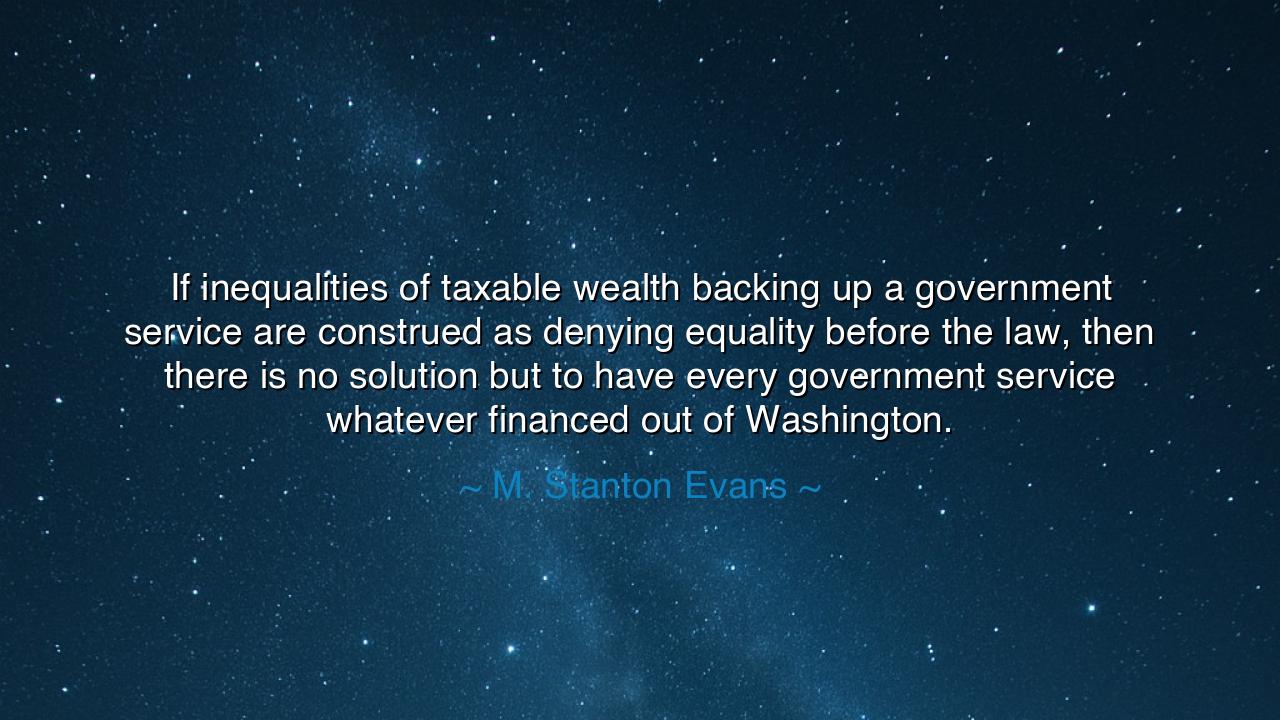
If inequalities of taxable wealth backing up a government service
If inequalities of taxable wealth backing up a government service are construed as denying equality before the law, then there is no solution but to have every government service whatever financed out of Washington.






“If inequalities of taxable wealth backing up a government service are construed as denying equality before the law, then there is no solution but to have every government service whatever financed out of Washington.” — M. Stanton Evans
In this sharp and prophetic statement, M. Stanton Evans, a conservative thinker and journalist, warns of the delicate balance between equality and federal power — a tension that lies at the heart of every republic. His words speak to a truth that echoes through the ages: that when the desire for perfect equality begins to override the principles of local freedom and self-government, the result is not justice but centralization. Evans reminds us that in the pursuit of fairness, nations must be cautious not to build systems that devour the very liberties they seek to protect.
To understand his meaning, we must first see the context from which his words arise. In the mid-twentieth century, America faced intense debates over taxation, education, and social policy — over whether differences in wealth among states and communities constituted a moral failure or simply the natural diversity of a free people. Evans saw the growing trend toward federal intervention — the belief that only Washington, with its vast resources and authority, could ensure fairness — and warned that this path, if taken too far, would strip away the independence of local institutions. His concern was not with equality itself, but with the price paid for its enforcement.
This idea has ancient roots. The philosophers of old knew that balance is the essence of good governance. Aristotle, in his Politics, warned that when a society seeks absolute equality, it risks destroying the virtues of diversity and independence. For just as the body is made of many parts with differing functions, so too must a nation allow for variety among its communities. Evans’ point reflects this ancient wisdom: that while the law must treat all citizens equally, it need not — and perhaps cannot — make every corner of the land identical in wealth or resource. To confuse these two forms of equality is to invite tyranny disguised as justice.
Consider the rise and fall of empires that sought to equalize all things through central control. In ancient Rome, the Republic once thrived because each province bore responsibility for its own welfare under a shared law. But as the Empire grew and the distant capital sought to manage every need, the weight of bureaucracy crushed the spirit of self-reliance. Local initiative withered; corruption spread. What began as a promise of unity became an empire of dependency. Evans’ warning mirrors this historical pattern — that the more a people look to a distant power for provision, the less capable they become of governing themselves.
At its heart, Evans’ quote is not an argument against equality before the law, but a defense of federalism — the principle that freedom flourishes when power is shared. He feared that redefining every inequality as an injustice would give rise to a new tyranny: the tyranny of uniformity. For if no difference can be tolerated — if all variation in wealth, schools, or opportunity must be erased by centralized control — then liberty itself is endangered. Equality, rightly understood, is the equal protection of rights, not the enforced sameness of outcomes.
And yet, his words carry a tension that remains relevant today. For inequality, if left unchecked, breeds resentment and division. The challenge for any society is to strike the balance — to uphold fairness without extinguishing freedom, to pursue justice without surrendering the dignity of local responsibility. Evans calls us to remember that true equality is born from virtue and self-governance, not from dependence on distant rulers. It is the harmony of liberty and order, not the domination of one by the other.
Let this be the teaching drawn from his wisdom: seek equality through empowerment, not compulsion. Strengthen communities so they may stand on their own; teach citizens to build rather than to beg. When each town, each family, each soul takes up the burden of justice, the nation as a whole grows freer and fairer. But when all power flows to the center — when Washington, or any capital, becomes both provider and master — then freedom wanes, and the citizen becomes a subject once more.
So remember, as M. Stanton Evans warned, that the promise of equality must never become the excuse for control. Justice must begin in the heart and the home, radiating outward through community and conscience — not imposed from afar by decree. For a nation that forgets this truth will soon find that in striving to make all men equal, it has made none of them truly free.






AAdministratorAdministrator
Welcome, honored guests. Please leave a comment, we will respond soon